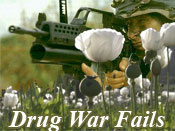 Drug war's latest achievement: Boosting global terrorism
Drug war's latest achievement: Boosting global terrorism
Afghanistan War Is Evidence that U.S. Failing in The War on Terror, Iraq, and the Drug War.
by Neal Peirce / Syndicated columnist
Thirty-eight million arrests, most for simple possession. Lives ruined, families disrupted. America turned into the most prison-happy nation on the face of the earth. Illegal rewards incentivizing shooting fields in inner-city neighborhoods — enough bloodshed to appall even an Al Capone. More than $1 trillion in taxpayer outlays.
Thirty-six years after President Richard Nixon inaugurated this country's misbegotten "war on drugs," worldwide narcotics markets are booming, drug-ring profits are higher than ever, and drugs cost less than ever on the street.
Our "war" is a miserable, incredibly costly failure.
But now, we're learning, there's a jarring new dimension. The drug war is directly feeding international terrorism. The most startling new evidence comes from Afghanistan, where the U.S. is leading a full-blown NATO campaign to eradicate production of poppies, the plant from which heroin is derived. Colossal failure is already apparent.
Afghanistan is producing 95 percent of the world's poppies; production rose 58 percent last year alone.
And the biggest beneficiary? It's the Taliban, gaining popularity as it protects local poppy farmers against the Western-led eradication campaign. Then it becomes the opium sales agent into international markets, reaping huge amounts of money it can plow back into its terrorist campaign against the West.
One result, it's fair to say: American soldiers, dying in skirmishes in Afghanistan, are the latest casualties in the international campaign we've waged incessantly — with friendly governments, inside the U.N., wherever we've had the chance — to make drugs globally illegal. American administrations, Republican and Democratic, persistently blame foreign countries and international drug supplies for our own domestic narcotics appetite.
And then, notes Jack Cole, executive director of Law Enforcement Against Prohibition, "we go to countries like Afghanistan, spend millions or billions over the years to spray poppies and coca plants, in the process risking poisoning of other crops and people on the ground. And despite that, every year we see bumper crops."
The other prime example is "Plan Colombia" — our multiyear, $4.7 billion (so far) campaign to stamp out coca production through spraying Colombia's farms, together with providing the Colombian government with military helicopters and sensitive intelligence-gathering technology. Our billions are also supposed to fight back FARC — the Revolutionary Armed Forces of Colombia — a 17,000-strong peasant-based army described by international crime and terrorism expert Misha Glenny as "by far the largest terrorist organization in the Southern Hemisphere." But FARC, like the Taliban, allies itself with local farmers and finances operations through the drug trade. Last year, coca production was up 8 percent.
Will we ever learn? President Bush now wants to channel about $1 billion to Mexico to fight "narco-trafficking and violence on our border." Like past Mexican presidents, Felipe Calderón has pledged a major anti-trafficking campaign, fighting drug cartels responsible just this year for more than 1,000 murders (including reporters, police and judges).
But more drug-fighting money to Mexico won't do any good, says Cole: The United States' prohibition policy has created a "super-obscene profit motive."
Will we find a presidential candidate willing to talk to us honestly about our disaster-strewn policy, to suggest rational paths toward drug legalization? To credit us with intelligence — that if we cared enough about our health to reduce drastically our consumption of readily available red meat, alcohol and tobacco, we might just be smart enough to resist dangerous narcotics?
I'm not holding my breath. Though, refreshingly, the rest of the world is starting to think afresh.
A prime example: The Senlis Council, a European-Canadian drug-policy institute that's done major research in Afghanistan, proposes licensing Afghanistan with the International Narcotics Control Board to sell its opium legally. Even a Western subsidy to pay Afghan farmers the same price the Taliban and drug lords do — about $600 million a year — would be well below what we're spending on eradication. And addiction is rare among pain patients.
Here's a chance for the West to spend money, visibly, helping poor Afghan farmers survive, instead of destroying their livelihoods. Simultaneously, the Taliban would lose its big revenue source for terrorist activities. Couldn't we be this humanitarian and smart — for once?
Neal Peirce's column appears regularly on editorial pages of The Times. His e-mail address is [email protected]
Copyright © 2007 The Seattle Times Company
"Go to Original" links are provided as a convenience to our readers and allow for verification of authenticity. However, as originating pages are often updated by their originating host sites, the versions posted on VT may not match the versions our readers view when clicking the "Go to Original" links.
(In accordance with Title 17 U.S.C. Section 107, this material is distributed without profit to those who have expressed a prior interest in receiving the included information for research and educational purposes. VT has no affiliation whatsoever with the originator of this article nor is VT endorsed or sponsored by the originator.)
ATTENTION READERS
We See The World From All Sides and Want YOU To Be Fully InformedIn fact, intentional disinformation is a disgraceful scourge in media today. So to assuage any possible errant incorrect information posted herein, we strongly encourage you to seek corroboration from other non-VT sources before forming an educated opinion.
About VT - Policies & Disclosures - Comment Policy




